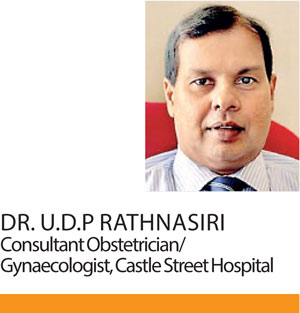22 Sep 2017 - {{hitsCtrl.values.hits}}

 Pregnancy is the next most awaited news after marriage. From the moment that the pregnancy test showes a positive result, newly expectant parents will plan out their entire pregnancy, leading up to the delivery and beyond. But unfortunately, things don’t always go as planned.
Pregnancy is the next most awaited news after marriage. From the moment that the pregnancy test showes a positive result, newly expectant parents will plan out their entire pregnancy, leading up to the delivery and beyond. But unfortunately, things don’t always go as planned.
However, the news that she has lost the baby in the womb can be devastating to a mom-to-be. Statistics show that about 15% to 20% known pregnancies end up in miscarriage. But the actual figures are much higher since many miscarriages occur so early after conception that the woman doesn’t even know that she was pregnant before the miscarriage happened.
Today, the Health Capsule decided to Consult Dr. U.D.P Rathnasiri, Consultant Obstetrician/Gynaecologist, Castle Street Hospital on the topic of miscarriage, why and how it occurs, the availability of treatment options for the future and most importantly how to avoid certain miscarriages, on behalf of our readers.

Miscarriage is the term used for a pregnancy that ends on its own, within 20 weeks of conception. Ultra Sound Scanning is the main tool of clinical diagnosis of a miscarriage. “Talking about miscarriages, it can be categorized in to various groups, according to which the method of management is determined,” states Dr. Rathnasiri. According to him, miscarriages fall in to four main categories.
Threatened miscarriage: Here, the mother is presented with bleeding from the vagina, but the fetus is still alive and the neck of the womb is closed. The focus of management is to stop the fetus from miscarrying. The mother is kept under observation and bed rest may be recommended until the threat of miscarriage has disappeared.
Missed miscarriage: Here the fetus isn’t alive, but the products of conception aren’t expelled from the body.
Incomplete miscarriage: This is similar to missed miscarriage, but only a portion of the products of conception have come out. In both these cases the main aim is to take the remaining fetal parts out of the womb, preventing the chance of infection in mother. This condition could lead to severe consequences with regard to the mother. This could be done either through oral medication or through surgically.
Complete miscarriage: In this case the fetus is dead and no parts are remaining in the womb. Main management is the reassuring of the mother and counseling her.
In addition to the treatment of the present condition, the patient will be counseled on re-conception. She is advised to ideally wait 3-4 months before planning to get pregnant again. This is the advice doctors give healthy mothers before they plan their next pregnancy. Advice differs when mothers have had a long term medical condition in which case she is referred to a physician to get the disease under control. If she is having a history of repeated miscarriages, investigations are done to identify the causes and to rectify them before the next pregnancy. “In rare cases, mothers who go through the ordeal of a miscarriage may need psychiatric counseling,” continues Dr. Rathnasiri.
What causes the body to miscarry a fetus? According to Dr. Rathnasiri, the majority of the miscarriages are due to genetic causes, meaning that there is an abnormality in the genes passing down from the mother and the father, resulting in an embryo that isn’t properly formed and isn’t viable. In some cases where the mother has uncontrolled disease conditions like Thyroid disorders or Diabetes, there is a higher probability of a miscarriage when compared to a young, healthy mother. Being obese and old are conditions which expose a pregnant mother to the risk of having a miscarriage. In addition, there are special circumstances that put the mother in danger of having a miscarriage like when the situation of the neck of the womb is too low.
Now, to the most important question of all. Can we prevent a miscarriage from happening? Unfortunately, there’s nothing we can do if the fetus has a genetic problem that causes severe defects and the body decides that it can’t be carried to term, but there are measures that we can take, in some, according to Dr. Rathnasiri. In the case where the mother is having chronic disease, it’s crucial to consult your physician before getting pregnant. Keeping the symptoms of the disease under control will help you have an uncomplicated pregnancy, resulting in better outcomes to both mother and baby. It’s ideal for women, who fall under the ‘obese’ category, to bring their BMI under control. Abstaining from bad habits like smoking, alcohol and drugs is also very important to carry a healthy baby to term, according to Dr. Rathnasiri.
“When should a pregnant women seek medical advice, with regards to miscarriage?”. “Seek immediate medical advice if you have per vaginal bleeding and cramping type abdominal pain, the sooner the better”, he recommends.
A miscarriage will have a big impact on a couple’s lives. In an event like this, the support of the family and friends is crucial. Understanding the medical aspects of a miscarriage, realizing that it wasn’t your fault and coming to terms with it can go a long way towards healing the mental wound. Talking with the healthcare provider, whether it’s the doctor or a midwife, and clearing any doubts is also important. The most vital thing is to follow medical advice and to prepare early for the subsequent pregnancy, which will result in a much happier outcome the next time around.
23 Dec 2024 2 hours ago
23 Dec 2024 3 hours ago
23 Dec 2024 6 hours ago
23 Dec 2024 7 hours ago